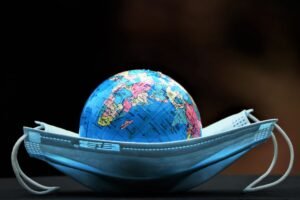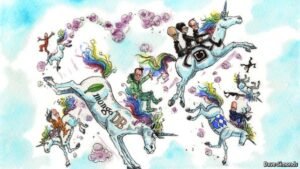NFC: The secret weapon of contactless payments
Contactless payments are the next logical phase of payments acquisition/acquiring.
Let's face it: Most of us are more introverted than we think. We push against it, deny it, and rap about being party rockers, but deep within, we would prefer if people kept their hands to themselves or their cards. We immediately imagine: I don't know where that's been.
At the height of 2020's COVID-19, Anthony Fauci surmised: I don't think we should ever shake hands again. And the reason goes beyond the easy transference/transmission of germs. It goes to the root of convenience, ease and purpose. When you think about it, today's digital payment sub-sector is so successful because of how much technology bridges the gap between a seller who's got the latest Nike sneakers to sell and a buyer who desires to rock them to a party this Friday.
Go online, find the vendor, punch in a few numbers, and the payment is done. Easy peasy. Who wants to spend 3 hours travelling from Badagry to Idumota to complete this transaction that took less than a minute on your Google Chrome?
But if the need for speed and the desire for convenience is true for online payments, why do cards need to be manually inserted into POS terminals or ATMs while you pray that digital village people do not disrupt the flow of your transaction or one of the background players does not have a downtime? The concern is also true for online payments, although without needing contact - which is the crux of my post. Contactless payments (or most things) are the future of payments everywhere. Adoption may take a while and require massive sensitization to build trust and regulatory fine-tuning, but it can (and should) be done.
On June 27, 2023, the CBN released Guidelines for Contactless Payments in Nigeria, a protocol which deepens the regulator's desire that operations in the payment system are standardized and also represents a laudable attempt to encourage innovative products. But not enough attention is paid to this niche area. Today, while most FinTech players operate in an elbow room saturated with similar products, I submit that more attention needs to be paid to contactless pay. While the same players will probably build the architecture to ensure that the payment goes through, anything can take payments. And the oil which makes this machinery work is called NFC.
NFC [Near-Field Communication] technology is a wireless technology that enhances the exchange of data and information between devices. It is short-range and uses radio waves, although unlike Bluetooth or WiFi. It is a darling for payments because only small amounts of data need be exchanged. In simple terms, if you have complied with regulatory conditions such as payment limits, KYC (Know Your Customer) and KYB (Know your Business), the payment protocol only needs to verify this data, cross-check with balance, switch and complete the process - all within the same miliseconds it would have taken you to insert your card or entered the details on a website. Only, this time, it is faster: you need not insert the card, punch in your pin, navigate to a browser, or [if you are germophobic] worry what germs you are currently attracting to your hand.
So, how does it really work?
Virtually all smartphones, wearable devices, and debit cards are NFC-enabled today. Your phone has an NFC chip that is idle, wondering what motivation you need to put it to work. Pioneered by Thomas Edison way back in the 1800s, nobody really explored the extent of it until the early 2000s. Nokia led the charge with the release of its Nokia 6131 Model in 2007. You know how you can use a security card to access hotel rooms, your office, etc.? The science is called radio-frequency identification (RFID). NFC is based on the RFID technology, but on a more superior, secure level because of the payment aspect to it. Naturally. The RFID frequency is unique and specific so that it avoids interference from other wireless devices. That's why you need two NFC devices close to each other to exchange information. This means that you can easily tap your device (card, phone, wristwatch) within inches of a payment terminal to make payments. "Payment terminal" is another broad, interchangeable term that we will explore at another time because this goes beyond POS; it can be a virtual terminal, a mobile phone, a tablet, etc.
Are there limitations to NFC payments or risks involved with this protocol? Of course there are. But they are no more than impediments which a dogged model cannot address. The risks are no more apparent or significant than what applies today should somebody get hold of your card's sensitive details or for an extreme case of shoulder snooping. Trust me, one of the big players just needs to push this heavily and implement strict risk detection/aversion protocols, and the market will rally.
Why you should pay attention:
According to Market Research Future, the global NFC market was valued at USD 26.3 billion in 2024 and is expected to grow to USD 60.2 billion by 2032.
You're welcome.
Bitcoin, FOMO, ETH and all the other 2021 slangs.

What do these strange letters, symbols, words mean? What is cryptocurrency?
Move over AI, you’re old news.
There’s a new kid on the block. Like a secondary school nickname for that one guy who’s always coming late, or always getting in trouble. Crypto.
But unlike that dude nobody wants to invite home during the holidays, everybody wants to associate with Crypto.
The crypto craze is so real that it’s turned virtually all of us into side-hustlers. Giant organisations who wanted nothing to do with it are now tripping over themselves in excitement, some concern and major trepidation. FOMO – the Fear Of Missing Out.
FOMO is a present concern in practically every aspect of life – tapping you and pointing in the direction of a blossoming venture; waking you up in the middle of the night, reminding you just how much time you are wasting and how you just might never catch up. When the excitement for cryptocurrencies began, most of us ignored it like it was just another hype that needed a firm hand, hammer or event to “calm down.” But if you are an attentive person, or spend any amount of time at all on social media, then at some point, lately, you might think: but this thing really isn’t slowing down – and what if I’m missing out on what could potentially change my life forever?
To put this in context, at one point in 2018, Bitcoin traded at $3,000. At its highest points so far this year, it’s topped over $60,000. Forget the current dip, it is projected to hit $100,000 before the year runs out. Some Bitcoin enthusiasts estimate it might hit a million dollars at some point in the future. That’s $1,000,000!
Are you starting to pay attention?
Do you understand the language FOMO speaks now? No? Yes?
We must admit it’s got us all right where it wants us. You could be in the middle of Lagos traffic, displaying periodic Nigeria-type driver drama and plotting graphs on your windscreen. A thought could hit you right in the midst of reviewing a critical contract, leaving you to wonder “so what exactly does p2p mean, and how can I double my investment by August?”
ETH is a short form for Ethereum, an alternative to Bitcoin the Adam and King of Cryptos.
So why exactly is everyone getting on the cryptocurrency train? And should you? Is the momentum sustainable? What do these all even mean?
I explore in another post.
Read some more of my writing here.
Are the days of WhatsApp's domination over?
WhatsApp is the favourite baby boy of social media. The dude around every corner. The most popular guy on the block. And for good reason - the ease and success with-which it's permeated our lives and seeped into our beings is being studied in schools.
Across several industries, we have felt the impact. Tech and engineering, science and research, business and investment, startup and entrepreneurship, leadership and mentorship, legal and data-mining.
Moving stealthily at first, then aggressively, it toppled the world's former favourite platform - BBM.
Regardless, on January 4, 2021, WhatsApp shipped out an update, consequently reviewing its Privacy Policy - an action that cascaded into a worldwide #BoycottWhatsApp Campaign. Within days, WhatsApp's rivals celebrated record-breaking new entrants. Signal: 40 million, Telegram: 25 million.
How it started vs how it's going ???? pic.twitter.com/ERiFpZUz6c
— Signal (@signalapp) January 14, 2021
From the corner of my eye, I watched as people erected social media, virtual placards and clamoured for us all to jump ship. Elon Musk simply tweeted "Use Signal" and thousands followed suit - rapping relentlessly about the need for us all to leave now. Uhm…not quite. I mean, I considered it. Even researched what features Signal really has. I did a random survey on my contact list and found out that a few people actually did download the app. I do have the Telegram App and have had it for almost 2 years. I love it and stand in awe of its outstanding features. Head to head, it has so much more features than WhatsApp.
But these competitors notwithstanding, is it time for WhatsApp to be toppled yet? Nah, I don't think so.
You see, as yet, the userbase is too strong. And there is the undeniable counter-attack and defence posture that Facebook and Instagram provide. These platforms are firm backbones that you simply cannot ignore. I can almost hear you thinking - 'but BBM used to be the rave of the moment, and look what happened to it.' It's really not quite the same. The decline and eventual death of BBM cannot entirely be traced to WhatsApp. In fact, it was self-inflicted.
Terrible internal policies, bad employee management, a needless redirection, loss of passion and vagrant neglect of good advice. The Research in Motion Management (owners of BBM) decided to focus on building Enterprise Applications, security software, at the expense of the one thing that put them past the mobile giants of the day. To reflect, BBM was so successful that despite being just an app, it pushed BlackBerry ahead of Nokia, Samsung and the giants of that day.
When Barack Obama became president, it is reputed that he refused to give his Blackberry up, instead saying that the officials who wanted him to stop using it would have to "pry it out of [his] hands".
Still, look how bad decisions killed its vibe.
I do not see WhatsApp making the same mistake. I have seen the company respond in real-time to competition, copy amazing features of its competition (though most times it's slower than we'd have appreciated). It is quick and responsive in terms of its policies, and has even responded quickly to the current concern by releasing a response to what it calls a misconception, extended the date by-which users need to accept the terms, and silently rolled out new features. Annnnd, there's Mark. Talking about entrepreneurs, Mark Zuckerberg is as dogged and rugged as they come. Look how much userbase he musters. At its height, BBM had less than 200 million users. In comparison, WhatsApp has more than 2 billion. Facebook, almost 3 billion. IG, over 1 billion. In an earlier post, I commented about how Mark controls a combined virtual, digital country of almost 5 billion people.
And left alone, undeterred by regulators or antitrust, anti-competition suits, Facebook is capable of buying both Telegram and Signal in seconds, without breaking a sweat. Don't put it past them.
So, to address the elephant in the room, what's all the fuss really about? And how much data does WhatsApp really hold on you?
I'll address this in another post.
But here's a pro tip: the time hasn't come for WhatsApp to be toppled. In fact, it's about to get bigger and better. Lots of exciting, amazing features are coming and I personally cannot wait. Yes, ADs are coming, and I'm sure you could have predicted that. But more - chat edits are coming for sent (delivered and already read messages), greater admin powers will arrive, disappearing messages have arrived, mini-websites within WhatsApp Business are coming.
This is the most exciting for me:
Multi-device support! In short, you will finally be able to sign in on many devices at once.
If the time ever comes to move and/or ditch WhatsApp, I'll let you know it.
So stay tuned ????
Read some more of my writing here.
The impacts of 2020 and COVID will stay with us forever.

Sometimes we need to take people literally at their word. Not infer a metaphor, not assume an implication. But take them at face value.
The 2020 experience.
For a year that appeared on the horizon promising to take our breath away, it looks like we misread the memo. Not to be a naysayer, pessimist or any such thing, the year has literally attacked our breathing system - individually, corporately and collectively. This attack for mankind's lungs would eventually crystallize in George Floyd's gruesome murder, instigating the worldwide "I can't breathe" campaign.
Our world has suddenly become a smaller, largely scarier, and more delicate place to live in. On the whole, this has impacted us to the very core of our beings and our unified race. And its impact won't leave in a hurry. Family life, faith, work, existence and socialization will feel the ripple effects forever.
I compiled a list of things that may never go back to the way they were.
Parties and condensed areas. It's the age of Zoom weddings and Instagram Live Introductions. Would you have assumed that there would be such a time as this? Parties are still currently outlawed in most parts of the world, marketplaces are running on shifts, people are observing strict physical and social distancing. What a time to be alive. Even when this is over, the consciousness for personal space will stay etched in our consciousness.
Social places [eateries, restaurants, clubs and parks, cinemas]. Get your food and leave! You may eat in your car or drive all the way home if you can wait, but the government and food vendors are saying: please love us from a distance, we'll do the same. That love waxing cold isn't sure to get warm anytime soon. Netflix and similar subscription-based movie screening and streaming are the future. Football viewing centres will suffer reduced patronage as wave after wave of the virus continues. Even after we find a cure, I'd rather just enjoy home-screening, thank you very much.
The Finance Industry. Cash transactions will slowly bite more bullets. Fintech is the future of banking. Technology is the future of virtually anything, anyway. But in particular, more transactions will move to digital, non-cash, tech-based forms. The prudent banker needs to take the time to garner as much knowledge in this field as possible because it's almost fully buffered. During the strictest periods of the lockdown, we realised how little one needed cash for things that really mattered. Online ordering, subscriptions, ticketing and e-wallets ensured that we were all safe behind our phone and computer screens while the virus ravaged and rummaged outside.
Worship centres and rigid religious idiosyncrasies. Three months now, we've all been barred from going to religious places. Churches, mosques and other religious centres where it seemed like physical attendance was the only way to worship have found ways to keep the faith and spiritual consciousness unhindered and on point. I personally have had to review a lot of idiosyncrasies I had regarding a myriad of issues, and although I haven't lost my faith [I am a practising Christian], I have realised how flimsy, lightweight some of the rigid beliefs and approaches I had were. A lot has changed in me, as I'm sure they have in many. God isn't a figment of our imagination, neither a product of our rigid and unbending "if you don't believe what I believe you're doomed" approach. Faith is extremely personal, and although our experiences do influence others, they should by no means be the lens by which we grade their morality, holiness or uprightness.
Real estate. This is a big deal - particularly commercial real estate. Working from home has become a darling phrase during these times; perhaps only beaten to second place by 'Coronavirus or COVID-19'. Employers who were originally adamant, unwilling to even consider the possibility of remote work, are now clutching the concept very close to their chests. It took only a few weeks of COVID-19's merciless punches to humble them. Costs are being cut, cut, cut. This can only mean that even when we leave these dangerous times, employers need no external data - they know that over 80% of work they've always compelled physical presence for can be done remotely. Still sure you need that intended million dollar commercial real estate project? Think again.
Did I miss out on any?
Please let me know in the comments.
And don't forget to share.
______
Read some more of my writing here.
That time when Social Media died - for hours.

Social media died - for hours.
Talk about 'understanding the times.' Many picked the wrong time to set sail with their goods on Thursday, March 14 2019. Sh** hit the fan. All hell broke loose. Pandemonium ensued. The three largest Social Media platforms - Facebook, WhatsApp and Instagram [MarkVille] - went down for at least 8 hours. While users wondered what sort of iceberg hit their beloved vessels, many jumped ship and took to Twitter. Twitter, home of banter, the world's headquarters for the hottest gist and gossip welcomed them with open arms. FacebookDown and InstagramDown chants filled the air in the way of hashtags, and Twitter influencers had a filled day.
Home to a combined 4.8 billion users, there's no larger country anywhere in the world. Put simply, if Mark was a President and the subscribers to his SM products were citizens, he would lead a land bigger than China and India.
What was lost?
Millions of companies advertise on MarkVille. In fact, many live there predominantly. They advertise, take orders, ship, restock, run promotions entirely there. When the outage occurred, most running ads simply disappeared - or well, took on Ghost mode. They were running but weren't leaving footprints. You couldn't see them. Imagine all billboards and posters taken down all over cities, and all shops shut down. Businesses couldn't showcase their wares properly, and buyers couldn't see.
On WhatsApp, it wasn't as drastic. While you could still continue chatting with the love of your life, it was your voice notes and lovely videos that suffered. You'd have had better luck getting a stubborn cow on a boat.
What caused it?
A glitch. A server outage that's bound to happen if you run an economy so dynamic, so diverse. Amid the scramble to restore order back to their systems, MarkVille had to resort to its rival, Twitter, to explain that this was being worked on and the nightmare would soon pass.
What if it happens again - this time on a grander scale? What if not just a part, but all of social media dies for more than hours, but days, ever?
It's not a first. Not a second. And it is bound to happen again. Twitter itself is experimenting with a side product called Twttr in a bid to redesign, overhaul its product.
While liability falls like a lot all around laps for these technological glitches, how is your business preparing to meet uncertainty squarely in the field of future uncertainty?
It may seem highly unlikely - especially as the Worldwide Web hit 30 on 12 March 2019. Somehow, the internet has survived.
But what if some internet-esque electromagnetic pulse hit, and everything was shut down? Or an alien civilization struck and took out Earth's technology first?
Doomsday scenarios beg for emergency procedures.
What nasty and brutish times await?
Read some more of my writing here.
The Rise of AI: are we in a fight for our future?
“By far the greatest danger of Artificial Intelligence is that people conclude too early that they understand it.”
― Eliezer Yudkowsky
The rise of AI and the fight for our future.
There's a new kid on the block. An elitist, hardly smiling loner we didn't really know much about until recently. A changer. A shapeshifter. A disruptor who cares little for the council of industrial 'elders' or the traditional waters of Status Quo. Unlike any character the ancients ever studied, he does what he wants, goes where he wants.
You see, from when man discovered how to make tents from bent iron, or how to make fire from cracked stones, we have come a long way. Today, there are million-dollar-a-piece drones, flying cars, self-driving bikes, gene-editing technologies, technological feats too amazing to believe.
But not all advancement is positive. As we continue to record major strides in the health sector, and we begin the countdown until Cancer is no longer a health threat, we must face our realities squarely.
Some believe that humanity's embrace of artificial intelligence is the action which eventually activates our extinction as a human race. Extremely intelligent systems trained to process exabytes of data in minutes don't have to do much to deactivate our defences, should they choose to. Some of the remarkable among the AI naysayers are the late esteemed astrophysicist Stephen Hawking and Elon Musk who have expressly cried out for the future threat AI poses.
But is there any merit to their fears?
A recent research project concluded by Google's DeepMind has revealed that as AI advances, it becomes more aggressive in its workings.
Here's what happened. DeepMind created a simple AI game called Gathering. The goal of the game was to gather apples. The AI agents were also armed with lasers to be used where necessary. With an abundance of apples, they cooperated. However, as the apples diminished, the AIs' attitude gradually changed. Subsequently, they began to attack each other.
Quite interestingly, the more advanced AIs were less interested in "bonding" and attacked others frequently, regardless of the state of the game's economy - abundance or scarcity.
What happens where there are indeed no apples to even compete for?
The more crucial question is: should the same scenario play out in real life, what will be the response of these AIs where their main competition is humans?
Is Elon Musk right after all?
Do humans have an exit plan? Should we enact laws that mandate a failsafe protocol should all the conspiracy theorists suddenly turn out right? Do we have measures in place to ensure companies comply with such protocol?
And if it is the Governments' responsibility to make laws regulating these strides, who checks the Governments as they secretly pursue their own agenda to dominate the world?
The rise of AI and the fight for our future is as crucial as any discourse we are having today about global warming and climate change.
Thoughts?
This post first appeared here on February 8, 2019.
You can also read some more of my writing here.
Robots may someday vote in elections.

Sophia the robot speaking at the AI for GOOD Global Summit, Geneva, Switzerland.
Robots may someday vote in our elections.
If you haven't heard of Sophia the robot, don't feel bad. You're not alone. Millions (maybe billions) of others haven't. Sophia is Hanson Robotics' most advanced project to date. An extremely advanced humanoid robot who tweets at @realsophiarobot on Twitter, she once bragged about surfing the web simply by thinking. Whenever you are having a bad day, just log in to Twitter, scroll to her profile, click on any of her tweets, and read the comments. Thank me later. If you're lucky enough to find any #AskSophia sessions, you've won a million bucks!
Here's how significant Sophia is. She is arguably the most intelligent robot ever designed. She has a sense of humour, carries on conversations in real-time, tweets and replies tweets. Giulio Di Sturco, a photographer once assigned to her said: "I had to step back and realize that she was a robot, not a human being."
Sophia has been featured on Jimmy Fallon's show (watch her singing here), has addressed the General Assembly of the United Nations, and has probably been to more countries than you have. Sorry.
But, as what? A world citizen? A machine?
On 25 October 2017, she received Saudi Arabian citizenship, making her the first robot globally to receive any such.
Her travel plans are unclear, so it's hard to tell if she has plans to come to Nigeria. But, assuming she does, and [resist a laugh] falls in love with a Nigerian, and [hold that laugh] they get married, could she become a Nigerian citizen by registration? Or could she even get "married" under Nigerian law?
Could she vote in elections?
Imagine Sophia in a wedding gown, and her "sister" (Little Sophia) running around a schoolyard.
The implications of a future shared with robot citizens are more than your adventurous brain can deal with.
Beyond elections, weddings and school plays, what bearing do the raging global arguments about feminism, abortion, gender rights, cross-country legislation have on Sophia and her artificial siblings?
Will robots someday vote in our elections? Will they someday contest for Presidency?
A lot remains to be seen.
Read some more of my writing here.












